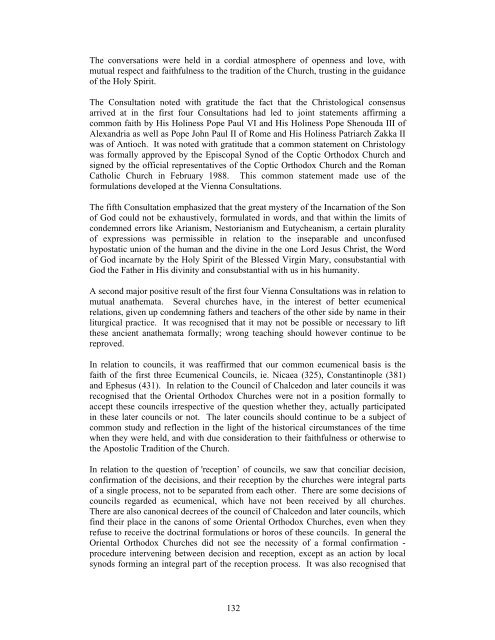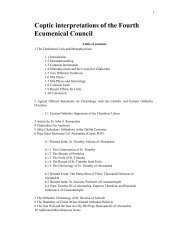Coptic Church & Ecumenical Movement - Saint Mina Coptic ...
Coptic Church & Ecumenical Movement - Saint Mina Coptic ...
Coptic Church & Ecumenical Movement - Saint Mina Coptic ...
Create successful ePaper yourself
Turn your PDF publications into a flip-book with our unique Google optimized e-Paper software.
The conversations were held in a cordial atmosphere of openness and love, with<br />
mutual respect and faithfulness to the tradition of the <strong>Church</strong>, trusting in the guidance<br />
of the Holy Spirit.<br />
The Consultation noted with gratitude the fact that the Christological consensus<br />
arrived at in the first four Consultations had led to joint statements affirming a<br />
common faith by His Holiness Pope Paul VI and His Holiness Pope Shenouda III of<br />
Alexandria as well as Pope John Paul II of Rome and His Holiness Patriarch Zakka II<br />
was of Antioch. It was noted with gratitude that a common statement on Christology<br />
was formally approved by the Episcopal Synod of the <strong>Coptic</strong> Orthodox <strong>Church</strong> and<br />
signed by the official representatives of the <strong>Coptic</strong> Orthodox <strong>Church</strong> and the Roman<br />
Catholic <strong>Church</strong> in February 1988. This common statement made use of the<br />
formulations developed at the Vienna Consultations.<br />
The fifth Consultation emphasized that the great mystery of the Incarnation of the Son<br />
of God could not be exhaustively, formulated in words, and that within the limits of<br />
condemned errors like Arianism, Nestorianism and Eutycheanism, a certain plurality<br />
of expressions was permissible in relation to the inseparable and unconfused<br />
hypostatic union of the human and the divine in the one Lord Jesus Christ, the Word<br />
of God incarnate by the Holy Spirit of the Blessed Virgin Mary, consubstantial with<br />
God the Father in His divinity and consubstantial with us in his humanity.<br />
A second major positive result of the first four Vienna Consultations was in relation to<br />
mutual anathemata. Several churches have, in the interest of better ecumenical<br />
relations, given up condemning fathers and teachers of the other side by name in their<br />
liturgical practice. It was recognised that it may not be possible or necessary to lift<br />
these ancient anathemata formally; wrong teaching should however continue to be<br />
reproved.<br />
In relation to councils, it was reaffirmed that our common ecumenical basis is the<br />
faith of the first three <strong>Ecumenical</strong> Councils, ie. Nicaea (325), Constantinople (381)<br />
and Ephesus (431). In relation to the Council of Chalcedon and later councils it was<br />
recognised that the Oriental Orthodox <strong>Church</strong>es were not in a position formally to<br />
accept these councils irrespective of the question whether they, actually participated<br />
in these later councils or not. The later councils should continue to be a subject of<br />
common study and reflection in the light of the historical circumstances of the time<br />
when they were held, and with due consideration to their faithfulness or otherwise to<br />
the Apostolic Tradition of the <strong>Church</strong>.<br />
In relation to the question of 'reception’ of councils, we saw that conciliar decision,<br />
confirmation of the decisions, and their reception by the churches were integral parts<br />
of a single process, not to be separated from each other. There are some decisions of<br />
councils regarded as ecumenical, which have not been received by all churches.<br />
There are also canonical decrees of the council of Chalcedon and later councils, which<br />
find their place in the canons of some Oriental Orthodox <strong>Church</strong>es, even when they<br />
refuse to receive the doctrinal formulations or horos of these councils. In general the<br />
Oriental Orthodox <strong>Church</strong>es did not see the necessity of a formal confirmation -<br />
procedure intervening between decision and reception, except as an action by local<br />
synods forming an integral part of the reception process. It was also recognised that<br />
132








